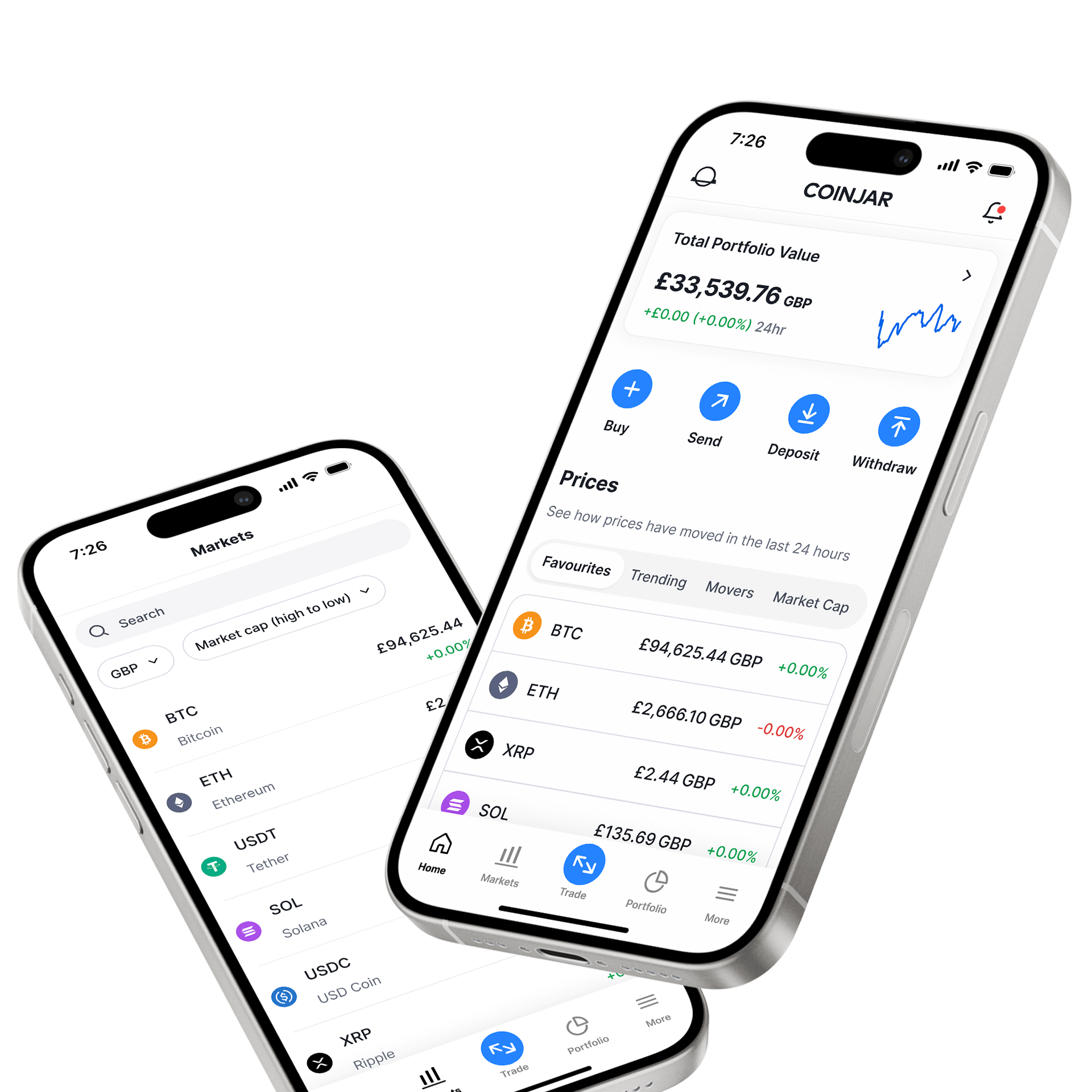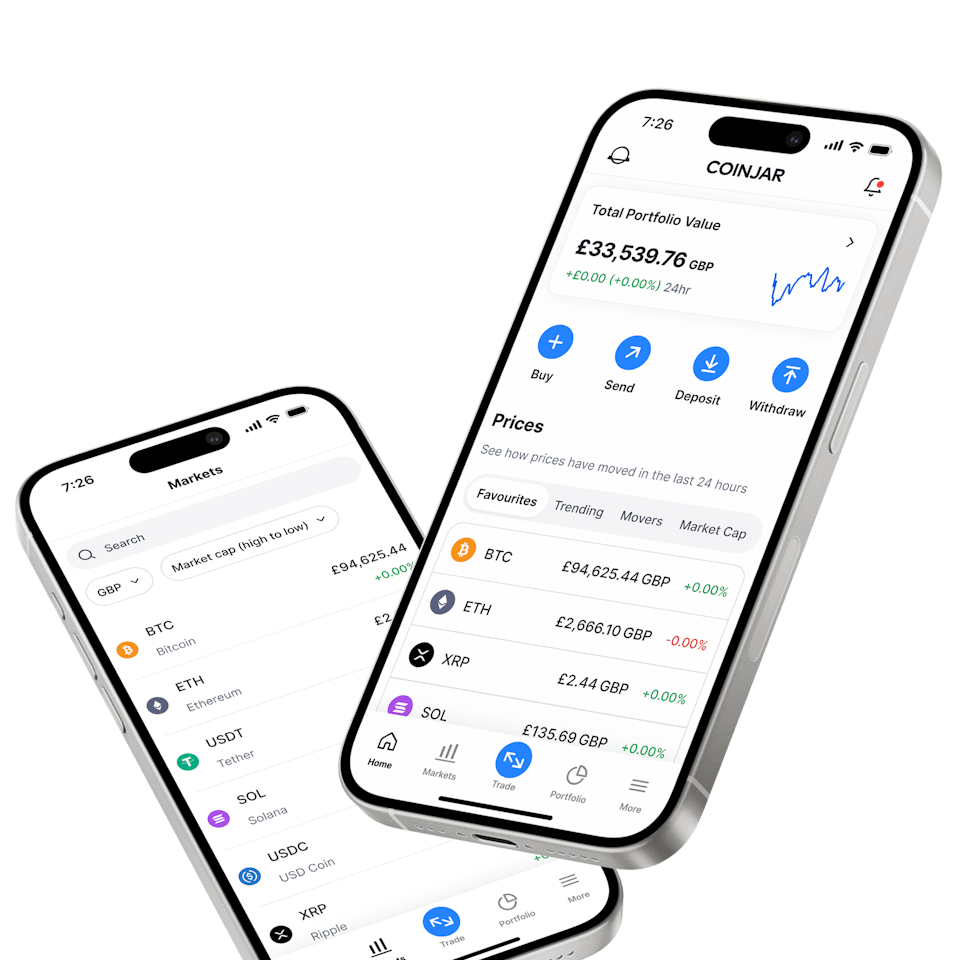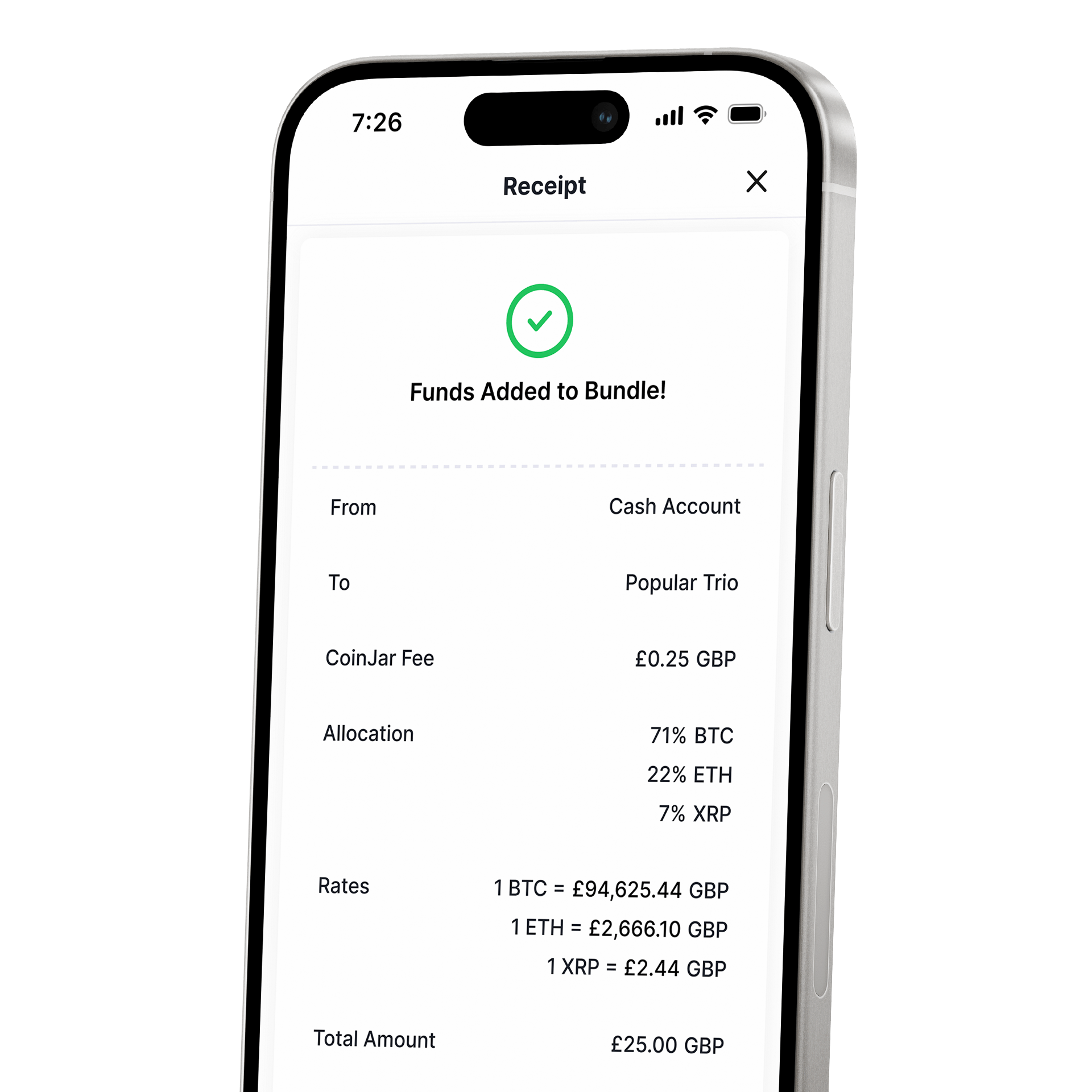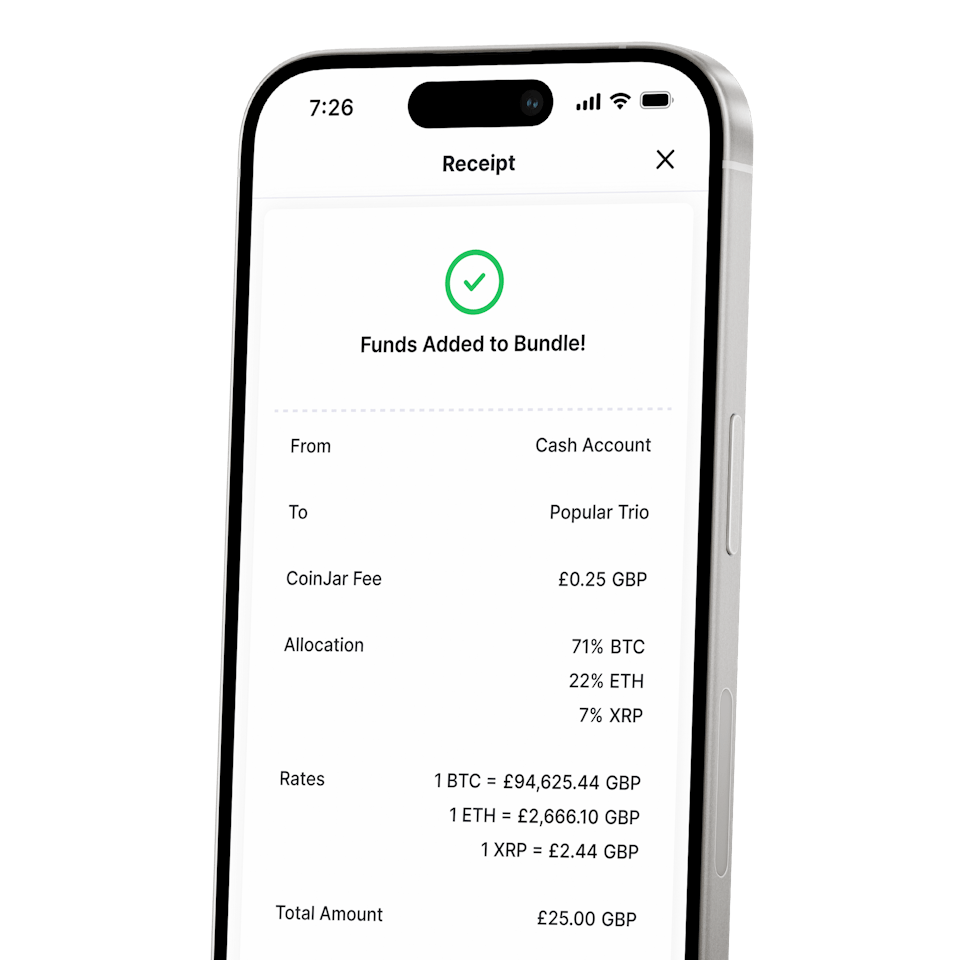Don’t invest unless you’re prepared to lose all the money you invest. This is a high‑risk investment and you should not expect to be protected if something goes wrong. Take 2 mins to learn more.
Buy PAX Gold (PAXG) in UK With GBP | CoinJar
PAX Gold
PAXG
Overview
What is PAX Gold?
Buy Paxos Gold (PAXG): This cryptocurrency is like a digital representation of gold stored by a third party.
Each PAX gold token you buy is equal to one ounce of real, physical gold. You don't get to take the gold home, but you own it – kind of like having a valuable item in a deposit box.
Why buy Pax Gold?
Convenient to trade
You can buy and sell PAXG on cryptocurrency exchanges, just like Bitcoin or Ethereum. This makes it convenient to invest in gold, even if you don't have a lot of money to start.
Fractional ownership
You don't have to buy a whole ounce of gold at once. PAXG lets you buy small fractions, making gold investing accessible to more people.
Protection
The physical gold backing PAXG is stored in professional vaults, so you don't have to worry about keeping it safe yourself.
Transparency
Paxos, the company behind PAXG, regularly checks and verifies the gold holdings.
How does it work?
Investors can buy PAXG
You purchase PAXG tokens on a cryptocurrency exchange using regular money or other crypto.
Ownership recorded
Your ownership of the PAXG tokens – and the corresponding amount of gold – is recorded on a blockchain, a protected digital ledger.
Gold in the vault
The physical gold represented by PAXG is stored safely in vaults. You can even look up the serial numbers of the gold bars backing your tokens!
Trade or redeem
You can hold onto your PAXG, trade it for other crypto or regular money, or (if you own a large enough amount) redeem it for physical gold bars.
Should investors buy Pax Gold?
If you're interested in gold as an investment but like the convenience of using crypto, PAXG could be a good option. It's a way to combine the “historical investment stability” of physical gold with the flexibility of digital assets.
But remember, the price of gold can go up and down, and there's always the risk of the company behind it having issues. It's important to do your research and understand the risks before investing.








Cash, credit or crypto?
Buy PAX Gold using Visa or Mastercard. Get cash in your account with Faster Payments Service (FPS). Convert crypto-to-crypto with a single click.How to buy PAX Gold with CoinJar
Start your cryptocurrency portfolio with CoinJar by following these steps.
Finder Awards Winner 2023
CRYPTO TRADING - VALUEFinder Awards Winner 2023
CRYPTO TRADING - VALUE
Featured In


CoinJar App
All-in-one crypto walletCoinJar App
All-in-one crypto wallet

CoinJar Exchange
FOR PROFESSIONAL CRYPTO TRADERS
CoinJar Exchange
FOR PROFESSIONAL CRYPTO TRADERS
CoinJar DCA & Bundles
AUTOMATE & DIVERSIFY YOUR PORTFOLIOCoinJar DCA & Bundles
AUTOMATE & DIVERSIFY YOUR PORTFOLIO
Frequently asked questions
What is Pax Gold (PAXG)?
Pax Gold (PAXG) is a digital asset representing one fine troy ounce of London Good Delivery gold bar stored in Brink's gold vaults. Each PAXG token is a digital representation of a specific amount of gold held in custody.
Who issues PAXG?
PAXG is issued by Paxos Trust Company, a financial institution known for its Paxos Standard (PAX) stablecoin.
Where is the physical gold backing PAXG stored?
The physical gold backing PAXG is securely stored in Brink's gold vaults, renowned for their security in precious metals storage.
How do I know the gold exists?
Paxos regularly undergoes audits to verify that the amount of gold bullion held in custody matches the outstanding PAXG tokens.
Can I redeem my PAXG for physical gold?
Yes, you can redeem your PAXG tokens for physical gold delivery, but only if you own a minimum amount, typically a Good Delivery gold bar.
What blockchain is PAXG on?
PAXG is an ERC-20 token, meaning it operates on the Ethereum blockchain.
How do investors buy Pax Gold?
You can buy Pax Gold (PAXG) on various cryptocurrency exchanges and platforms that support ERC-20 tokens.
Why would I buy Pax Gold instead of physical gold?
Pax Gold offers a convenient and protected way to invest in gold without the hassle of storing and insuring physical gold. It also provides fractional ownership, allowing you to buy a portion of an ounce of gold.
Is Pax Gold a good investment for capital management?
While Pax Gold offers some potential advantages for capital management due to its connection to the gold market, it's important to consult with a financial advisor before making any investment decisions.
What are the risks of investing in Pax Gold?
Like all investments, Pax Gold carries risks. The price of gold can fluctuate, and there's always the risk of the company behind it having issues.
Standard Risk Warning: The above article is not to be read as investment, legal or tax advice and it takes no account of particular personal or market circumstances; all readers should seek independent investment advice before investing in cryptocurrencies.
The article is provided for general information and educational purposes only, no responsibility or liability is accepted for any errors of fact or omission expressed therein. Past performance is not a reliable indicator of future results.
We use third party banking, safekeeping and payment providers, and the failure of any of these providers could also lead to a loss of your assets. We recommend you obtain financial advice before making a decision to use your credit card to purchase cryptoassets or to invest in cryptoassets. Capital Gains Tax may be payable on profits.
CoinJar's digital currency exchange services are operated in the UK by CoinJar UK Limited (company number 8905988), registered by the Financial Conduct Authority as a Cryptoasset Exchange Provider and Custodian Wallet Provider in the United Kingdom under the Money Laundering, Terrorist Financing and Transfer of Funds (Information on the Payer) Regulations 2017, as amended (Firm Reference No. 928767). In the UK, it's legal to buy, hold, and trade crypto, however cryptocurrency is not regulated in the UK.
It's vital to understand that once your money is in the crypto ecosystem, there are no rules to protect it, unlike with regular investments. You should not expect to be protected if something goes wrong. So, if you make any crypto-related investments, you're unlikely to have recourse to the Financial Services Compensation Scheme (FSCS) or the Financial Ombudsman Service (FOS) if something goes wrong.
The performance of most cryptocurrency can be highly volatile, with their value dropping as quickly as it can rise. Past performance is not an indication of future results. Remember: Don't invest unless you're prepared to lose all the money you invest. This is a high-risk investment and you should not expect to be protected if something goes wrong. Take 2 mins to learn more at: https://www.coinjar.com/uk/risk-summary.
UK residents are required to complete an assessment to show they understand the risks associated with what crypto/investment they are about to buy, in accordance with local legislation. Additionally, they must wait for a 24-hour "cooling off" period, before their account is active, due to local regulations. If you use a credit card to buy cryptocurrency, you would be putting borrowed money at a risk of loss.
We recommend you obtain financial advice before making a decision to use your credit card to purchase cryptoassets or to invest in cryptoassets.
Specific risks associated with DeFi tokens Decentralised Finance (or 'DeFi') tokens (e.g. UNI, AAVE) are crypto-assets linked to financial applications and protocols built on decentralised blockchain technology. DeFi tokens carry the following risks:
Smart contract risk: DeFi relies heavily on smart contracts. Even a minor coding error or oversight can lead to a contract being exploited, potentially resulting in significant losses for DeFi tokens.
Regulatory risk: DeFi operates in a decentralised manner, often without intermediaries or financial crime controls. Regulatory bodies across jurisdictions might introduce new regulations impacting the use, value, or legality of certain DeFi protocols or assets.
Rug-pulls / Exit scams: Some DeFi projects might be launched by anonymous or pseudonymous teams, increasing the risk of "rug pulls" where developers abandon the project and withdraw funds, leaving investors with worthless tokens.
Data/oracle risk: DeFi protocols often rely on external data sources or 'oracles. Manipulation or inaccuracies in these data sources can lead to unintended financial outcomes within the protocols. Protocol complexity: The complexity of some DeFi protocols can make it difficult for average users to fully understand the mechanisms and associated risks.
Specific risks associated with meme coins:
'Meme coins' (e.g. DOGE, SHIB, PEPE) are crypto-assets whose value is driven primarily by community interest and online trends.
Meme coins carry the following risks:
Volatility risk: Meme coins can have extreme price volatility, often experiencing rapid and unpredictable price fluctuations within short periods. The value of meme coins can be influenced by social media trends, celebrity endorsements, and other factors unrelated to traditional investment fundamentals. Lack of utility: Meme coins often lack intrinsic value or utility, being primarily driven by community interest, online trends, and speculative trading.
Market manipulation: Meme coins may be susceptible to increased risk of market manipulation including 'pump-and-dump' schemes, where the price is artificially inflated followed by a sudden crash.
Lack of transparency: Meme coins may have limited available information about their development teams, goals, and financials. This lack of transparency can make it challenging to assess the credibility and potential of a meme coin accurately.
Emotional investing: Meme coins often garner strong emotional reactions from investors, leading to impulsive decisions. Emotional trading activity can amplify losses.
Specific risks associated with stablecoins:
There is a risk that any particular stablecoin may not hold their value as against any fiat currency; or may not hold their value as against any other asset. Stablecoins carry the following risks:
Depegging events: Depegging events may occur with stablecoins that fail to maintain adequate controls and risk mitigants. A depegging event is when the value of the stablecoin no longer matches the value of the underlying asset. This could result in a loss of some or all of your investment.
Counterparty risk: Counterparty risk arises when an asset is backed by collateral, involving a third party maintaining the collateral, which introduces risk if the party becomes insolvent or fails to maintain it.
Redemption risk: Redemption risk refers to the possibility that an asset's ability to be redeemed for underlying collateral may not be as anticipated during market fluctuations or operational issues.
Collateral risk: Collateral risk refers to the possibility of the collateral's value declining or becoming volatile, potentially impacting the asset's stability, particularly when it is another crypto-asset.
Exchange rate fluctuations: Stablecoins, often denominated in US Dollars, expose investors to fluctuations in the USD:GBP exchange rate. Algorithmic risk: Algorithm risk refers to the possibility of an asset's stability being compromised due to unexpected failure or behaviour of the underlying algorithm, potentially leading to loss of value.
CoinJar does not endorse the content of, and cannot guarantee or verify the safety of any third-party websites. Visit these websites at your own risk.
Your information is handled in accordance with CoinJar’s Privacy Policy.
Cryptoassets traded on CoinJar UK Limited are largely unregulated in the UK, and you are unable to access the Financial Service Compensation Scheme or the Financial Ombudsman Service.
We use third party banking, safekeeping and payment providers, and the failure of any of these providers could also lead to a loss of your assets.
We recommend you obtain financial advice before making a decision to use your credit card to purchase cryptoassets or to invest in cryptoassets. Capital Gains Tax may be payable on profits.
CoinJar’s digital currency exchange services are operated in the UK by CoinJar UK Limited (company number 8905988), registered by the Financial Conduct Authority as a Cryptoasset Exchange Provider and Custodian Wallet Provider in the United Kingdom under the Money Laundering, Terrorist Financing and Transfer of Funds (Information on the Payer) Regulations 2017, as amended (Firm Reference No. 928767).
Apple Pay and Apple Watch are trademarks of Apple Inc. Google Pay is a trademark of Google LLC.
This site is protected by reCAPTCHA and the Google Privacy Policy and Terms of Service apply.

